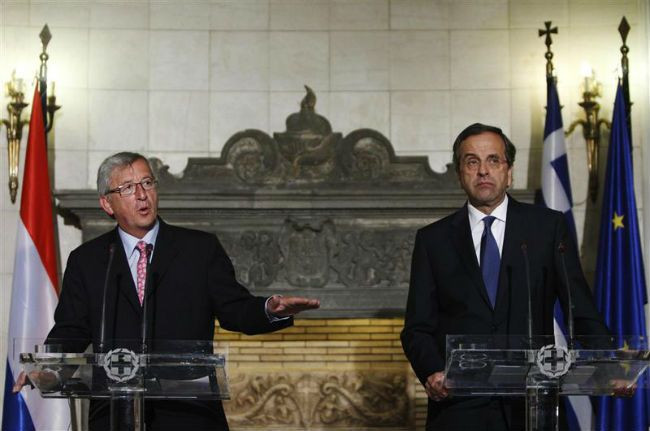
Eurogroup chief Jean-Claude Juncker kept alive Greek hopes of winning more time to push through austerity cuts but warned the country was staring at its "last chance" to avoid bankruptcy.
Mired in a fifth year of recession, Greece has been lobbying for two more years to hit budget targets promised under its second, 130-billion euro bailout from the European Union and International Monetary Fund.
On Tuesday Juncker became the most senior European leader to visit Athens since a new conservative-led government took power in June promising to fulfill austerity pledges Greece made to receive a bailout, but to seek more time to reach the targets.
Prime Minister Antonis Samaras' plea for "air to breathe" has been met with hostility in the Netherlands and European paymaster Germany. Juncker said a decision to grant more time would depend on the findings of a review by EU and IMF lenders on the country's progress in fulfilling its pledges.
He accompanied that with a warning to Greece to shore up its dire finances, saying the country's next tranche of aid would depend on it producing a credible strategy for austerity cuts.
"As far as the immediate future is concerned the ball is in the Greek court," Juncker said. "In fact this is the last chance and Greek citizens have to know this."
Juncker's show of support for Greece's conservative-led government comes as a welcome boost for Samaras, who has begun a charm offensive to convince European leaders he has the will to ram through unpopular reforms and deserves more time to do it.
"All we want is a bit of 'air to breathe' to get the economy running and to increase state income. More time does not automatically mean more money," Samaras told Germany's mass-market Bild newspaper before the talks with Juncker.
"Let me be very explicit: we demand no additional money. We stand by our commitments and by fulfilling all our requirements."
That failed to impress the Dutch finance minister, whose country has been a vocal critic of Greece's slow pace of reform.
"If it concerns delaying reforms and budget cuts, then it is not a good idea," Jan Kees de Jager told reporters.
NO GREEK EXIT
Appointed in June after two tumultuous parliamentary elections, Samaras has been juggling opposing demands from voters at home fed up with austerity and irate policymakers abroad demanding more painful cuts from Greece.
With cash coffers running empty and renewed talk of a Greek euro zone exit without more aid, Samaras travels to Berlin on Friday to meet German Chancellor Angela Merkel and to Paris a day later for talks with French President Francois Hollande.
Initially vocal about demanding more time from lenders, Samaras's government has toned down its rhetoric on the issue in recent weeks and now expects merely to broach the idea during talks this week rather than formally request it.
Merkel has already said she and Samaras will not make any decisions during their talks, adding she too would wait for the lenders' report on Greek progress in meeting targets. That report is not expected until late September.
Juncker acknowledged that Greece was struggling with a "credibility crisis" but reiterated he was against Greece exiting the euro which he said would be of no help to Greece and "entail major risks for the whole euro area."
A rising number of economists now believe Greece will remain in the euro zone, although talk of a "Grexit" has lingered. The country remains hugely off track from targets and officials expect a new debt restructuring will be likely - with the ECB and euro zone governments bearing the cost.
Juncker said he was against a third bailout for Greece, and instead urged Athens to step up structural reforms and privatizations to drag its economy back from the brink.
Athens has likened its recession to America's Great Depression. Nearly one out of four Greeks are jobless, and thousands of businesses have shuttered since the sovereign debt crisis exploded in 2009.
WRANGLING OVER CUTS
Samaras promised his administration would soon agree about 11.5 billion euros in cuts for the next two years that his government has been wrangling over for weeks.
Samaras and his two coalition partners have broadly agreed on the measures, but the government is struggling to nail down the final cuts amid howls of protest over plans to slash pensions and put civil servants in a so-called labor reserve before laying them off.
The measures will be presented for approval to the "troika" of officials from the European Commission, European Central Bank and IMF due back in Athens early next month before a verdict in October on whether to keep money flowing to Greece.
After his election victory in June averted fears of an imminent Greek euro zone exit, Samaras won a positive initial reception from European governments, relieved that firebrand leftist leader Alexis Tsipras narrowly failed to assume power.
Tsipras's SYRIZA party, which campaigned on a pledge to abandon the terms of the bailout keeping Greece afloat, said Juncker had turned down a request to meet its young leader.
SYRIZA lawmaker Dimitris Papadimoulis called the snub "a massive institutional discourtesy and an insult".
"Mr. Juncker needs to give an explanation, because from what I see, tomorrow he is free all morning," Papadimoulis said.
© Thomson Reuters.




